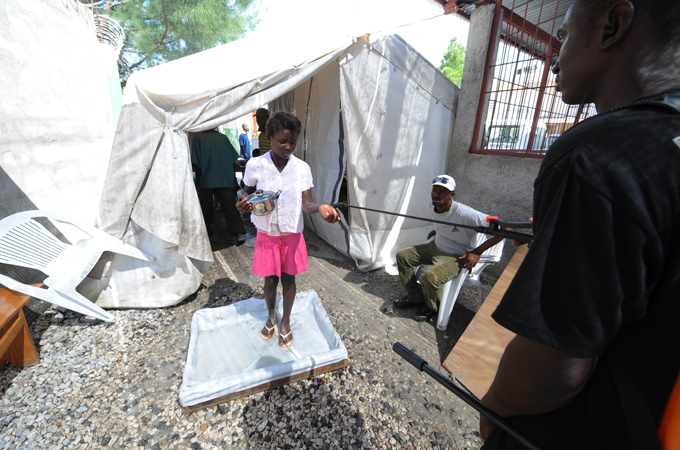Cholera crisis deepens in Haiti
Fears grow over rapid spread of cholera in the capital, as death toll rises to 724 people across the nation.

 |
| Doctors Without Borders said the increase in the number of patients with cholera-like symptoms was worrying [AFP] |
Haiti’s cholera crisis has deepened as three more deaths in Port-au-Prince, the capital, raised fears the epidemic could be set to rocket in unsanitary camps full of survivors from January’s earthquake.
The Haitian health ministry said on Thursday that 724 people around the country had now died from the highly contagious water-borne disease and that the number of infections had passed the 11,000 mark.
Keep reading
list of 4 itemsPalestinian Prisoner’s Day: How many are still in Israeli detention?
‘Mama we’re dying’: Only able to hear her kids in Gaza in their final days
Europe pledges to boost aid to Sudan on unwelcome war anniversary
The outbreak, Haiti’s first in more than 50 years, erupted in the Artibonite River valley in mid-October and initially seemed to have been contained to central and northern areas.
There have been roughly 1,000 new cases on each day this week and the death curve is getting steadily steeper with 60 new fatalities recorded on Wednesday and more than 80 on Thursday.
More worrying still is the fact that three more deaths have been confirmed in Port-au-Prince, which recorded its first fatality from the disease on Tuesday.
‘Overwhelmed’
“If cholera cases continue to rise at this rate, we’ll quickly be overwhelmed,” warned Yves Lambert, head of infectious diseases at the main public hospital in central Port-au-Prince.
Most of the estimated 1.3 million Haitians living in refugee camps are in tent cities around the capital and cholera could spread easily in filthy conditions where scarce water supplies are shared for cooking and washing.
Haitian authorities have been warned to expect an even larger scale of disaster if cholera continues to take hold in the capital, much of which was flattened by a January earthquake that killed more than 250,000 people.
Leading humanitarian organization Doctors Without Borders (MSF) said this week it was extremely concerned at the increase in the number of patients with cholera-like symptoms in the capital’s slums
and tent cities.
“The increasing numbers of cases of suspected cholera in our facilities throughout Port-au-Prince are certainly alarming,” said the statement from Stefano Zannini, MSF head of mission in Haiti.
MSF, which runs the Saint Catherine’s Hospital in the Cite Soleil slum where the capital’s first cholera fatality was confirmed, is constructing an additional 320-bed facility in the Sarthe neighborhood.
Oxfam said it had a team of 25 staff working around the clock with a water, hygiene and sanitation program reaching about 100,000 people to distribute soap, water purification tablets, buckets and rehydration salts.
“It is a very serious development that cholera has spread in Port-au-Prince,” the organisation said in a statement.
“However, it is understandable. With heavy rains and flooding over the weekend, in an environment where there is poor sanitation, waterborne diseases like cholera spread very rapidly.”
Storm damage
Hurricane Tomas, which claimed more than 20 lives in Haiti at the weekend, aggravated the situation as it dumped heavy rains that caused rivers, including the believed source of the cholera, the Artibonite, to flood.
The storm damage has increased concern about the plight of Haitians in rural areas, where many cholera sufferers are reported to be struggling to get medical help, some of them in villages cut
off by the flooding.
Desperate scenes were described in the northern town of Gonaives where some 60 people were said to have died with cholera-like symptoms in the past few days.
“Sick people died on the way to the hospital, the bodies were covered in blankets and left near the town cemetery,” Adolphe Jean-Francois, the city mayor, told AFP earlier this week.
The Pan American Health Organization, the regional office of the UN’s World Health Organisation, has warned Haiti to expect hundreds of thousands of cases over several years now that the disease
appears to have taken hold.
“The epidemic of cholera, a highly contagious disease, is no longer a simple emergency, it’s now a matter of national security,” the director of Haiti’s health ministry, Gabriel Thimote, told a
press conference on Tuesday.
Although easily treated, cholera has a short incubation period and causes acute diarrhea that can lead to severe dehydration and sometimes death in a matter of hours.